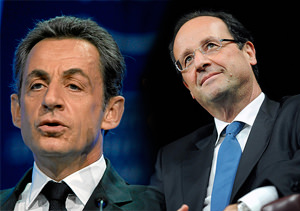Forget Le Pen, It’s Down to Two
The French elections have settled one question, that of the two finalists for the presidency.
PARIS — The French elections have settled one question, that of the two finalists for the presidency. There were some who believed that the nationalist right candidate, Marine Le Pen, might outdo President Nicolas Sarkozy, who, in the campaign polls, trailed his Socialist challenger, Francois Hollande.
When the French voted last Sunday, the two were close to a tie, with Hollande less than one-and-a-half percentage points ahead of the president in the final official results (28.63 percent over 27.18 percent).
This was because the heritress of the rightist National Front Party, Le Pen, daughter of Jean-Marie Le Pen, a fixture on the French nationalist and anti-immigrant right since before his first presidential run in 1974 (when he got a miniscule 0.74 percent of the national vote). His daughter took 17.9 percent of the total presidential vote on Sunday, more than her father ever won (sounds of gnashing teeth in the senior Le Pen household!), even more than in 2002, when Jean-Marie was all alone running against Jacques Chirac in the second and decisive tour of the presidential vote.
This year, many election observers had expected that the minor-party candidate likely to have the most influence on the overall result, by stealing votes from Hollande, would be the new hard-left candidate Jean-Luc Melenchon, whose dramatic and demagogic eloquence drew unexpectedly large crowds to his rallies.
He turned out to appeal mainly to older voters nostalgic for the rough-and-tumble campaigns of the old Communist Party during the days when it dominated the French left — before the Socialist Francois Mitterrand in 1981 made it not only safe but chic for the French to vote for a newly united left and have a Socialist as president. Melenchon, running as representative of a “Leftist Front,” got only 11.1 percent of the vote last Sunday.
Now the question is: Who wins on May 6, the day the electorate chooses between Sarkozy and Hollande? There will be one national televised debate (Sarkozy wanted three; Hollande probably wanted none at all, as he is not a natural debater, or even speaker — his campaign speeches mostly rehashed Socialist party positions, as he made an awkward effort to assume the oratorical style and gestures of the late President Mitterrand).
The past is a problem for the European political left, not only in France. What new does it have to offer? The best Hollande could do to mobilize his electorate was a promise of 60,000 new schoolteachers — pleasing to the teachers’ unions (the Socialists’ solidest voting bloc). This grew cloudier as the days passed, with confusion as to whether they would be new recruits, or replacements for those retiring, and how they would be paid for in these austere times, since a French civil servant, such as a teacher, is guaranteed lifetime employment.
He also promised to reduce by half the number of students who graduate without a formal qualification. No one has explained how to do that without devaluing standards.
He promised to give immigrants with more than five years legal residence a vote in local elections, a promise his party has made before without getting around to carrying it out.
France is renowned for the scope and generosity of its welfare state. In austere times, it is hard to find the money to improve it.
On the other hand, fiscal policies are tempting since on anything important the whole euro currency bloc has to agree, if not the entire European Union. Thus Hollande promises to renegotiate the December 2011 European fiscal pact and make the European Central Bank promote growth and jobs, something the bank’s president, Mario Draghi, now also proposes. Hollande also wants to set a marginal tax rate of 75 percent for everyone with income of more than a million euros a year. (If he were American, he could win a lot of votes on that.)
Sarkozy suffers the incumbent’s problem of what else is he expected to do that he has not already done? Answer: Further tax reform; tax French expatriates; raise the TVA, set “Buy European” rules; and cut the number of immigrants France admits by half. All pretty familiar.
The president’s personal problem is that his personality has alienated a great many voters. His erratic dynamism gets on their nerves. He is “bling-bling” nouveau riche, a foreigner (his father was an immigrant); his French is not elegant; he went to law school rather than the elite state management school or one of the literary, philosophical or engineering “grands ecoles” from which the elite mostly graduates. He is not “presidential.” He acts like a pally American.
On the other hand, he gets things done. He saved Georgia from the consequences of a ridiculous invasion of Russian-allied territory. He intervened in Libya while America was dithering. He is making an early withdrawal of French troops from Afghanistan because he presumably thinks the war there has become a fiasco. He has a large helping of common sense. And his “friends” are now conducting a campaign accusing Hollande of actually being a privately educated, tax-avoiding inheritor of a paternal fortune, with no experience of ever governing anything! It’s now class warfare in France.
Visit William Pfaff’s website for more on his latest book, “The Irony of Manifest Destiny: The Tragedy of America’s Foreign Policy” (Walker & Co., $25), at www.williampfaff.com.
© 2012 Tribune Media Services, Inc.
Your support matters…Independent journalism is under threat and overshadowed by heavily funded mainstream media.
You can help level the playing field. Become a member.
Your tax-deductible contribution keeps us digging beneath the headlines to give you thought-provoking, investigative reporting and analysis that unearths what's really happening- without compromise.
Give today to support our courageous, independent journalists.






You need to be a supporter to comment.
There are currently no responses to this article.
Be the first to respond.